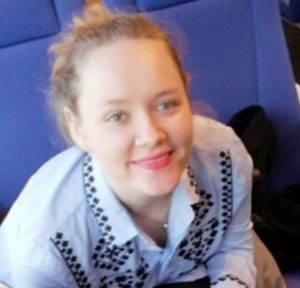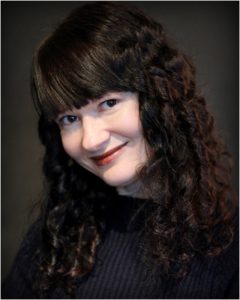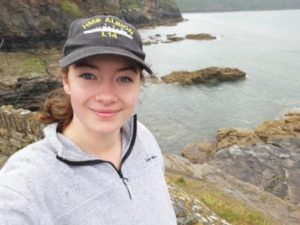Meet the PTUC Team!
PTUC Lead
Brad Beaven
 Brad Beaven is Professor in Social and Cultural History and has worked at the University of Portsmouth since 1994. He has published widely on urban popular culture in Britain in the nineteenth and early twentieth centuries. He is author of Leisure, Citizenship and Working-Class Culture, 1850-1945 (2005), Visions of Empire: Patriotism, Popular Culture and the City, 1850-1939 (2012) and Dickens and the Victorian City (with Patricia Pulham, 2012). He has contributed on working-class leisure for both BBC radio and television programmes, most recently, The Golden Age of Coach Travel (2011) and British Passions on Film (2012).
Brad Beaven is Professor in Social and Cultural History and has worked at the University of Portsmouth since 1994. He has published widely on urban popular culture in Britain in the nineteenth and early twentieth centuries. He is author of Leisure, Citizenship and Working-Class Culture, 1850-1945 (2005), Visions of Empire: Patriotism, Popular Culture and the City, 1850-1939 (2012) and Dickens and the Victorian City (with Patricia Pulham, 2012). He has contributed on working-class leisure for both BBC radio and television programmes, most recently, The Golden Age of Coach Travel (2011) and British Passions on Film (2012).
Brad is the Port Towns and Urban Cultures Project Leader and is currently researching port-town urban culture in the nineteenth and early twentieth centuries, focusing on the topography of sailortowns. Brad is an experienced doctoral supervisor and welcomes PhD applicants interested in popular culture and the city c.1800 – 1945. Follow Brad @BradJBeaven
See all of Brad’s publications here. See Brad’s posts on this website
Staff members
Melanie Bassett
Dr Melanie Bassett is Research Fellow in Public Engagement (SASHPL) at the University of Portsmouth. She manages the PTUC website and social media outputs alongside undertaking her own research on port towns. Her PhD research, ‘The Royal Dockyard Worker in Edwardian England: Culture, Leisure and Empire’ re-examined the concept of a monolithic imperial identity and tracked the nuances of working-class imperialism. Her current research expands on her original thesis to explore the affect of empire on those workers who went to work in the Royal Dockyards abroad such as Bermuda, Malta, Gibraltar and Hong Kong.
She has worked with Professor Brad Beaven on a number of WW1 projects, including ‘Mapping the National Impact of the Jutland Battle: Civic and Community Responses during the First World War’ and ‘Lest We Forget’ in partnership with Portsmouth City Museum, which culminated in a large-scale exhibition that commemorated the ways that Portsmouth and its people experienced the War. Mel previously worked in museums and was employed at Portsmouth City Museum and the Royal Naval Museum. Prior to becoming Faculty Research Fellow she was Research Assistant on the AHRC-funded War Widows’ Stories project at Liverpool John Moores University. Follow Melanie @melanie_bassett See Melanie’s posts on this website
Karl Bell
 Dr Karl Bell is Reader in History. His research interests revolve around aspects of the fantastical imagination in the nineteenth century. He has published work on magic, witchcraft, urban folklore, millenarianism, and supernatural readings of landscape. His first book, The Magical Imagination: Magic and Modernity in Urban England, 1780-1914 (2012) has been shortlisted for the 2012 Whitfield Prize. He is also the author of The Legend of Spring-heeled Jack: Victorian Urban Folklore and Popular Cultures (2012).
Dr Karl Bell is Reader in History. His research interests revolve around aspects of the fantastical imagination in the nineteenth century. He has published work on magic, witchcraft, urban folklore, millenarianism, and supernatural readings of landscape. His first book, The Magical Imagination: Magic and Modernity in Urban England, 1780-1914 (2012) has been shortlisted for the 2012 Whitfield Prize. He is also the author of The Legend of Spring-heeled Jack: Victorian Urban Folklore and Popular Cultures (2012).
Karl’s interests within the Port Towns project relate to local ghost lore, spatial narratives, and popular urban mentalities. He is currently developing work on invasion scares and future war fiction in nineteenth-century port towns. He would be happy to hear from potential PhD candidates who would like to work in any of these areas. Follow Karl @drkarlbell
See all of Karl’s publications here
Matthew Heaslip
 Dr Matthew Heaslip is Senior Lecturer in Naval History. His research focuses upon the twentieth century Royal Navy and its role within Britain’s wider imperial system, during both peace and war. He is author of Gunboats, Empire and the China Station: The Royal Navy in 1920s East Asia (2020).
Dr Matthew Heaslip is Senior Lecturer in Naval History. His research focuses upon the twentieth century Royal Navy and its role within Britain’s wider imperial system, during both peace and war. He is author of Gunboats, Empire and the China Station: The Royal Navy in 1920s East Asia (2020).
Matthew’s current research explores how the Royal Navy actually used its dominance at sea in East Asia to project power over other nations on a day-to-day basis through gunboat diplomacy, amphibious operations, and imperial policing. In particular, the role and experiences of those who served on the interwar China Station and the people they encountered, and what this all meant for the British Empire as a whole and the individuals themselves.
Rob James
 Dr Rob James is Senior Lecturer in History. His research interests centre on British society’s leisure habits, in particular the relationship between leisure provision and consumption in the early twentieth century. He is author of Popular Culture and Working-Class Taste in Britain 1930-39: a round of cheap diversions? (2010), and numerous articles on aspects of popular taste and cinema-going in Britain, including ‘Cinema-going in a Port Town, 1914-1951: Film booking patterns at the Queens Cinema, Portsmouth, UK’, Urban History, 40.2, 2013.
Dr Rob James is Senior Lecturer in History. His research interests centre on British society’s leisure habits, in particular the relationship between leisure provision and consumption in the early twentieth century. He is author of Popular Culture and Working-Class Taste in Britain 1930-39: a round of cheap diversions? (2010), and numerous articles on aspects of popular taste and cinema-going in Britain, including ‘Cinema-going in a Port Town, 1914-1951: Film booking patterns at the Queens Cinema, Portsmouth, UK’, Urban History, 40.2, 2013.
Rob’s current research project investigates leisure provision and consumption in British port towns in the first half of the twentieth century. It assesses the responses of civic elites to the growing number of leisure activities on offer in these towns, and the ways in which the townspeople participated in them. He welcomes prospective PhD applicants interested in any aspect of popular culture in twentieth century Britain. Follow Rob @RobJames68
See all of Rob’s publications here. Read Rob’s posts on the website
Margarette Lincoln
 Dr Margarette Lincoln is a Visiting Researcher at the University of Portsmouth. Her latest book, London and the 17th Century: The Making of the World’s Greatest City was published by Yale in 2021. She is Curator Emeritus at the National Maritime Museum, Greenwich, where she was Deputy Director until 2015, and was a Fellow at Goldsmiths, University of London from 2015 to 2020. Her previous books include Trading in War, about 18th-century maritime London, which was nominated for the 2019 Wolfson History Prize and named London Historians’ Book of the Year; British Pirates and Society, 1680–1730 (2014); and the catalogue for the Museum’s special exhibition, Samuel Pepys: Plague, Fire, Revolution, edited in 2015.
Dr Margarette Lincoln is a Visiting Researcher at the University of Portsmouth. Her latest book, London and the 17th Century: The Making of the World’s Greatest City was published by Yale in 2021. She is Curator Emeritus at the National Maritime Museum, Greenwich, where she was Deputy Director until 2015, and was a Fellow at Goldsmiths, University of London from 2015 to 2020. Her previous books include Trading in War, about 18th-century maritime London, which was nominated for the 2019 Wolfson History Prize and named London Historians’ Book of the Year; British Pirates and Society, 1680–1730 (2014); and the catalogue for the Museum’s special exhibition, Samuel Pepys: Plague, Fire, Revolution, edited in 2015.
Her current research project focuses on women from 1650 to the present. A social and cultural history within an urban context, it explores the lives of women at all levels of society and looks at changes in British society through their experiences. It will touch on such topics as imperialism, working-class culture, leisure history, sea bathing, and the urban environment.
Rudolph Ng
 Dr Rudolph Ng teaches East Asian and Latin American history at the University of Portsmouth. His research interests revolve around global migration in the nineteenth century and its relations to labour rights and humanitarianism concepts. He is preparing a book manuscript on the history of Chinese migration to Cuba, Peru, and Chile during the nineteenth century, when the Chinese laborers essentially replaced the dwindling population of enslaved Africans post-abolitionist movement. Before assuming the lectureship at Portsmouth, he was a Teaching Fellow at the University of Edinburgh and Lecturer in Modern Chinese History at Birkbeck, University of London.
Dr Rudolph Ng teaches East Asian and Latin American history at the University of Portsmouth. His research interests revolve around global migration in the nineteenth century and its relations to labour rights and humanitarianism concepts. He is preparing a book manuscript on the history of Chinese migration to Cuba, Peru, and Chile during the nineteenth century, when the Chinese laborers essentially replaced the dwindling population of enslaved Africans post-abolitionist movement. Before assuming the lectureship at Portsmouth, he was a Teaching Fellow at the University of Edinburgh and Lecturer in Modern Chinese History at Birkbeck, University of London.
Cathryn Pearce
 Dr Cathryn Pearce is a Part-time Senior Lecturer for the MA Naval History programme. She previously taught maritime history at the University of Greenwich, and was formerly an Associate Professor of History at University of Alaska Anchorage. Her research focuses on coastal communities responses to shipwrecks on their shores during the eighteenth and nineteenth centuries. She is author of Cornish Wrecking: Reality and Popular Myth, 1700-1860 (2010), and she has contributed to BBC television programmes such as Timewatch: The Wreckers and Timeshift: Shipwrecks, as well as BBC Radio 4’s ‘Making History’ programme. In her spare time, Cathryn is on the Society for Nautical Research (SNR) Council and she serves on the editorial board of the SNR’s INT-1 journal, The Mariner’s Mirror. She is also Chair and Trustee of the British Commission for Maritime History, a Fellow of the Royal Historical Society and a member of the Navy Records Society.
Dr Cathryn Pearce is a Part-time Senior Lecturer for the MA Naval History programme. She previously taught maritime history at the University of Greenwich, and was formerly an Associate Professor of History at University of Alaska Anchorage. Her research focuses on coastal communities responses to shipwrecks on their shores during the eighteenth and nineteenth centuries. She is author of Cornish Wrecking: Reality and Popular Myth, 1700-1860 (2010), and she has contributed to BBC television programmes such as Timewatch: The Wreckers and Timeshift: Shipwrecks, as well as BBC Radio 4’s ‘Making History’ programme. In her spare time, Cathryn is on the Society for Nautical Research (SNR) Council and she serves on the editorial board of the SNR’s INT-1 journal, The Mariner’s Mirror. She is also Chair and Trustee of the British Commission for Maritime History, a Fellow of the Royal Historical Society and a member of the Navy Records Society.
Cathryn’s current research focuses on the history of lifesaving and coastal communities, with particular emphasis on the role of the Shipwrecked Fishermen and Mariners’ Royal Benevolent Society, founded by some of the most important naval officers of the nineteenth century. See a selection of Cathryn’s publications here. Follow Cathryn @CathrynPearce
Mathias Seiter
 Dr Mathias Seiter is Senior Lecturer in History. His research on Central Europe during the long 19th century focuses on liminal spaces such as port towns and borderlands as well as on identity formation, nation building, public health, and German-Jewish history. His current project on port towns explores the history of German naval towns such as Kiel and Wilhelmshaven as well as of colonial ports which were frequented by German naval sailors between the 1860s and 1918. The research assesses the interplay and connectedness of various identities which existed within these port towns and maps how urban spaces such as sailortowns were constructed and perceived. See all of Mathias’ publications here.
Dr Mathias Seiter is Senior Lecturer in History. His research on Central Europe during the long 19th century focuses on liminal spaces such as port towns and borderlands as well as on identity formation, nation building, public health, and German-Jewish history. His current project on port towns explores the history of German naval towns such as Kiel and Wilhelmshaven as well as of colonial ports which were frequented by German naval sailors between the 1860s and 1918. The research assesses the interplay and connectedness of various identities which existed within these port towns and maps how urban spaces such as sailortowns were constructed and perceived. See all of Mathias’ publications here.
PhD Candidates
Ida Jørgensen
 Ida Jørgensen is currently writing her PhD on European shipbuilding in the 18th century. She holds a master’s degree in naval history from University of Copenhagen (2014) and another in maritime archaeology from University of Southern Denmark (2016). In her research, Ida focuses on the technology behind naval shipbuilding in 18th century Europe and the international links between the European naval nations of the time. The research examines the exchange of technology, mainly clandestine, in a period affected by conflict and political instability. It attempts to put into perspective the European relations in today’s time of coherence.
Ida Jørgensen is currently writing her PhD on European shipbuilding in the 18th century. She holds a master’s degree in naval history from University of Copenhagen (2014) and another in maritime archaeology from University of Southern Denmark (2016). In her research, Ida focuses on the technology behind naval shipbuilding in 18th century Europe and the international links between the European naval nations of the time. The research examines the exchange of technology, mainly clandestine, in a period affected by conflict and political instability. It attempts to put into perspective the European relations in today’s time of coherence.
With former employment in the reals of Danish museums and maritime archaeology, Ida are an experienced presenter of history as well as an archaeological surveyor in the field. See Ida’s posts on this website
Ivana Lam
 Ivana Lam is a full time doctoral candidate at the University of Portsmouth, researching the history of the British military and naval medicine in China from 1839 to 1900. She will analyse how medicine and hygienic practices in the British Army and Royal Navy changed during this period and the effects of these reforms on mortality and morbidity rates, especially in relation to the Opium Wars and the Taiping Rebellion. Her work draws upon various sources including papers from the War Office and Admiralty archives, newspapers, parliamentary proceedings, annual health reports, and detailed notes from surgeons who record treatments given to soldiers and sailors and measures taken to preserve their health. Particular attention will be paid to British public opinion; which was becoming increasingly concerned about the health of servicemen and the preservation of the British empire. Ivana’s thesis will also explore how the conflicts in China affected the way the British came to view China and its people, and how they took care of its armed forces in military garrisons such as that in Hong Kong. This work follows from her recently completed MRes in Humanities and Social Sciences (History) at the University of Portsmouth. Ivana’s research interests include the history of health, medicine, epidemic diseases, the British experience in China, the British empire, and the British armed forces.
Ivana Lam is a full time doctoral candidate at the University of Portsmouth, researching the history of the British military and naval medicine in China from 1839 to 1900. She will analyse how medicine and hygienic practices in the British Army and Royal Navy changed during this period and the effects of these reforms on mortality and morbidity rates, especially in relation to the Opium Wars and the Taiping Rebellion. Her work draws upon various sources including papers from the War Office and Admiralty archives, newspapers, parliamentary proceedings, annual health reports, and detailed notes from surgeons who record treatments given to soldiers and sailors and measures taken to preserve their health. Particular attention will be paid to British public opinion; which was becoming increasingly concerned about the health of servicemen and the preservation of the British empire. Ivana’s thesis will also explore how the conflicts in China affected the way the British came to view China and its people, and how they took care of its armed forces in military garrisons such as that in Hong Kong. This work follows from her recently completed MRes in Humanities and Social Sciences (History) at the University of Portsmouth. Ivana’s research interests include the history of health, medicine, epidemic diseases, the British experience in China, the British empire, and the British armed forces.
Rhys Phillips
 Rhys Phillips is a part-time Doctoral Candidate at the University of Portsmouth, completing a PhD thesis entitled ‘The forgotten volunteers: the role of the Sea Fencibles during the British response to the threat of Napoleonic invasion, 1798-1810’. His wider research interests include the ‘experience’ of the invasion threat in port town communities, and the subsequent state mounted countermeasures that followed. He is also keen to explore the varying motivations, class, and identity of the Georgian maritime volunteers. In January 2017, Rhys delivered a paper on the same topic to the Portsmouth Historical Association. See Rhys’ posts on this website. Follow Rhys @RhysPOspreys
Rhys Phillips is a part-time Doctoral Candidate at the University of Portsmouth, completing a PhD thesis entitled ‘The forgotten volunteers: the role of the Sea Fencibles during the British response to the threat of Napoleonic invasion, 1798-1810’. His wider research interests include the ‘experience’ of the invasion threat in port town communities, and the subsequent state mounted countermeasures that followed. He is also keen to explore the varying motivations, class, and identity of the Georgian maritime volunteers. In January 2017, Rhys delivered a paper on the same topic to the Portsmouth Historical Association. See Rhys’ posts on this website. Follow Rhys @RhysPOspreys Charlotte Steffen
Charlotte Steffen
Charlotte Steffen is a PhD Student at Portsmouth University who is researching Chinese students in Europe from the 1860s until the 1930s. Within her research she is particularly interested in the cross-cultural transfer of knowledge and its influence on the individual experience and impact on the global culture. She holds a Bachelor’s in Liberal Arts and Sciences from Tilburg University and a Master in Art & Heritage: Policy, Management and Education from Maastricht University.
Follow her on twitter @Charlot_Stef
Suzanne Marie Taylor
Suzanne Marie Taylor is from Vancouver, Canada where she studied theatre at Douglas College. Upon moving to the United Kingdom, Suzanne co-wrote and starred in a comedy sketch show at the Edinburgh Fringe Festival, and completed further theatre training at the London Academy of Performing Arts, where she received her Postgraduate Diploma in Classical Acting. In 2001, Suzanne became an actress and dedicated volunteer at the archaeological site of the 1587 Rose Playhouse on Bankside in London, raising awareness of the historical and archaeological significance of the site, and interpreting the archaeological remains of the Rose through performance. In 2018 Suzanne was nominated for the Mayor of London’s “Unsung Heroic Women” special recognition award, and she continues to receive numerous invitations to speak about the Rose for various universities and archaeological societies such as Georgia State University in 2021, and the City of London Archaeological Society (COLAS) in 2021. Engaging with the archaeological remains of the Rose prompted Suzanne’s desire to study archaeology. In 2019 Suzanne completed her Master of Arts degree in Archaeological Practice at Birkbeck, University of London, and she is currently a second year PhD student in the School of Art, Design and Performance at the University of Portsmouth. Suzanne’s current interdisciplinary research focuses on interpreting the archaeological remains of WW1 submarine chaser- motor launch (M.L.)286 through performance. In 2021, Suzanne had the idea to create a maritime podcast which has resulted in the 2022 launch of Beyond the Porthole with fellow PhD students Daisy Turnbull and Charlotte Steffen. Suzanne is a volunteer at Fulham Palace as well as a volunteer for the seafarers’ charity- Stella Maris. Suzanne is a singer with the London Sea Shanty Collective and the University of Portsmouth choir, an actress with the Shake-scene Shakespeare Company, and an active member of the Nautical Archaeology Society (NAS) and the City of London Archaeological Society (COLAS).
Daisy Turnbull
 Daisy Turnbull is a PhD student of History on a split site project between the University of Portsmouth (UK) and the University of Halmstad (SE). Her current research focuses on coastal and maritime cultures of Britain and Sweden from 1700 to 1850, looking at ship wrecking on the North Sea coastline. She is a multidisciplinary scholar with degrees in both history and archaeology, and works in a digital and blue humanities format. She is a member of the Chartered Institute of Archaeology, the Nautical Archaeological Society, the Coastal History Network and the IHR’s History Lab, as well as PTUC. Daisy’s passion for maritime heritage was first sparked at the Mary Rose Museum; she eventually went on to work for the museum for nearly four years and has taken on numerous public engagement roles within heritage organisations. Most recently she assisted in establishing a field museum and engagement programme for L-P: Archaeology at an archaeological site for the Hs2 project in Buckinghamshire that appeared on the BBC show Digging for Britain. Daisy is also one of the founding hosts and editor for the new Beyond the Porthole Podcast. Follow Daisy on Twitter: @time_daisy Website: thetimetravelersdaughter.wordpress.com
Daisy Turnbull is a PhD student of History on a split site project between the University of Portsmouth (UK) and the University of Halmstad (SE). Her current research focuses on coastal and maritime cultures of Britain and Sweden from 1700 to 1850, looking at ship wrecking on the North Sea coastline. She is a multidisciplinary scholar with degrees in both history and archaeology, and works in a digital and blue humanities format. She is a member of the Chartered Institute of Archaeology, the Nautical Archaeological Society, the Coastal History Network and the IHR’s History Lab, as well as PTUC. Daisy’s passion for maritime heritage was first sparked at the Mary Rose Museum; she eventually went on to work for the museum for nearly four years and has taken on numerous public engagement roles within heritage organisations. Most recently she assisted in establishing a field museum and engagement programme for L-P: Archaeology at an archaeological site for the Hs2 project in Buckinghamshire that appeared on the BBC show Digging for Britain. Daisy is also one of the founding hosts and editor for the new Beyond the Porthole Podcast. Follow Daisy on Twitter: @time_daisy Website: thetimetravelersdaughter.wordpress.com
Jenna Twyford-Jones
 Jenna Twyford-Jones is a Doctoral Candidate, working on the nineteenth and early-twentieth century history of Tiger Bay, Cardiff’s ‘Sailortown.’ Her research explores the relationship between the residential and working community of Tiger Bay with the rest of the Cardiff city region, with particular attention to the contemporary media portrayal of this multicultural, multinational ‘Sailortown.’ The types of work the community engaged in, their leisure pursuits, civic life, social interactions, and familial ties all contribute to this research. This work follows on from her recently completed MA with Distinction in History from the Open University. Jenna’s wider historical interests include Black British and Anglo-Jewish history, as well as the history of immigration as a whole, especially to south Wales. Blog: https://tigerbaytales.wordpress.com/ Twitter: @JRTwyfordJones Instagram: @porttownpics
Jenna Twyford-Jones is a Doctoral Candidate, working on the nineteenth and early-twentieth century history of Tiger Bay, Cardiff’s ‘Sailortown.’ Her research explores the relationship between the residential and working community of Tiger Bay with the rest of the Cardiff city region, with particular attention to the contemporary media portrayal of this multicultural, multinational ‘Sailortown.’ The types of work the community engaged in, their leisure pursuits, civic life, social interactions, and familial ties all contribute to this research. This work follows on from her recently completed MA with Distinction in History from the Open University. Jenna’s wider historical interests include Black British and Anglo-Jewish history, as well as the history of immigration as a whole, especially to south Wales. Blog: https://tigerbaytales.wordpress.com/ Twitter: @JRTwyfordJones Instagram: @porttownpics
See Jenna’s posts on this website
Corey Watson
 Corey Watson is a PhD Candidate funded by the Lloyd’s Register Foundation that will examine and assess the impact and influence of LR surveyors in China between 1869-1918. The project will investigate not only the social and cultural dimensions of the LR’s historic operations in China; it will also consider the role of the surveyors in the developing western understandings of maritime health and safety. It will do so by drawing upon the comprehensive reports produced by these surveyors, the LRF’s extensive digitised archive, and other archival material from across the UK and in China. Corey was a winner of the 2020 BCMH undergraduate prize for his dissertation on the early nineteenth century navy and their encounters with the slave trade and has recently completed an MA at the University of Plymouth. His research interests include nineteenth and twentieth century maritime and naval history, East Asia, and the cultural encounter between Imperial Britain and non-European societies in a maritime setting. Follow Corey on Twitter: @Corey433
Corey Watson is a PhD Candidate funded by the Lloyd’s Register Foundation that will examine and assess the impact and influence of LR surveyors in China between 1869-1918. The project will investigate not only the social and cultural dimensions of the LR’s historic operations in China; it will also consider the role of the surveyors in the developing western understandings of maritime health and safety. It will do so by drawing upon the comprehensive reports produced by these surveyors, the LRF’s extensive digitised archive, and other archival material from across the UK and in China. Corey was a winner of the 2020 BCMH undergraduate prize for his dissertation on the early nineteenth century navy and their encounters with the slave trade and has recently completed an MA at the University of Plymouth. His research interests include nineteenth and twentieth century maritime and naval history, East Asia, and the cultural encounter between Imperial Britain and non-European societies in a maritime setting. Follow Corey on Twitter: @Corey433










